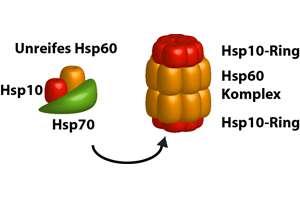Molecular chaperones help with folding

Chaperones are molecular helpers that assist other proteins with folding. One such chaperone is the so-called heat shock protein 60 (Hsp60). This protein forms structures in mitochondria that resemble barrels in which folding processes take place. A team of researchers at the University of Freiburg led by the assistant professor Dr. Thomas Becker worked with research groups led by Prof. Dr. Bettina Warscheid and Prof. Dr. Sabine Rospert in a study in which they discovered how these barrels, or protein machines, form. The scientists recently published their research results in the Journal of Biological Chemistry.
Mitochondria are the powerhouses of the cell. In order to perform vital functions, they import more than a thousand different proteins. These proteins acquire their mature structure in the mitochondria so that they can be active. This process is referred to as protein folding. Chaperones lend proteins a helping hand, making sure that they do not form dysfunctional protein aggregates. These chaperones are also referred to as heat shock proteins (HSPs) because their number is increased under stressful conditions, such as high temperatures.
Mitochondria contain two main types of folding helpers: Hsp70 and Hsp60. Hsp70 helps with the transport of proteins into the mitochondria, and it stimulates the first steps of folding. Hsp60, on the other hand, forms barrel-like structures that consist of two chambers. Each chamber is created by a ring of seven Hsp60 molecules. The unfolded proteins are encapsulated inside the chambers, where they can acquire their mature conformation. The Hsp60 barrels can only function with the help of a small protein called Hsp10, which forms a ring of seven subunits that acts as a kind of lid for the Hsp60 chambers.
Until now, little was known about how the Hsp60 barrels are formed. The team of researchers from the University of Freiburg have discovered a previously unknown function of Hsp70 in the assembly of the Hsp60 complexes. Dr. Lena Böttinger, who is a member of Becker's research group, discovered that Hsp70 interacts with Hsp10 to assemble Hsp60 molecules into a molecular barrel. The researchers were thus able to gain insight into a key step in the formation of Hsp60 complexes. Dysfunctions in Hsp70 and Hsp60 are associated with disorders in the nervous system, such as Parkinson's and spastic paraplegia. This study could help scientists to better understand the molecular foundations of these disorders in the future.
More information: "Mitochondrial heat shock protein (Hsp) 70 and Hsp10 cooperate in the formation of Hsp60 complexes." J. Biol. Chem. 290, 11611-11622. DOI: 10.1074/jbc.M115.642017
Journal information: Journal of Biological Chemistry
Provided by Albert Ludwigs University of Freiburg

















